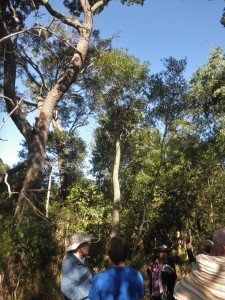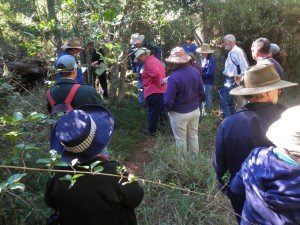Meeting at Bicentennial Park in Mundubbera last Friday, more than a dozen people from around Mundubbera and beyond, jumped on board a bus and headed out to learn from botanist and author Bill McDonald. The group explored a remnant patch of dry rainforest – also known as softwood scrub, or semi-evergreen vine thicket – just 10 minutes out of town. Mr McDonald had been to this very site 23 years prior and had a list of the species he and his colleagues from the Queensland Herbarium had found then; and as each one was found, they were identified by the group and ticked off the list. Forty-six species were found then, and most were found again as well as six more. Some of the trees, while only 10-15m tall are believed to be up to 100 years old.
The group discussed identification techniques such as milk sap, oil dots and of course the flowers and fruits, but also the best management options of these small remnants on private land. Green panic is an introduced weed to these scrub areas and grazing stock, fire management and other weeds need to be considered when managing these areas.
Mr McDonald commended landholders who are voluntarily conserving remnants such as the one they visited, either with fencing or without.
The field trip was run as part of the Healthy Habitats program, an initiative of the Burnett Mary Regional Group and funded as part of the Australian Governments Caring for our Country program.
If anyone in our region has semi-evergreen vine thicket on their property and wishes to know more about how the Healthy Habitats program can assist you in protecting or enhancing these scrubs, please call us on (07) 4166 3898.


